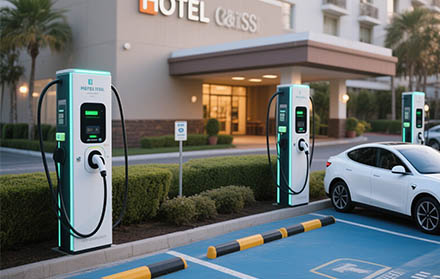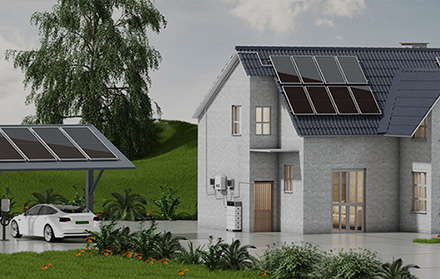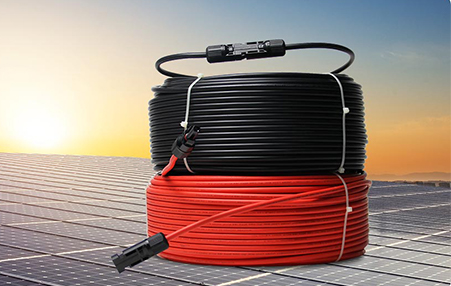How Much Does a Commercial EV Charging Station Cost?
The rapid growth of electric vehicles (EVs) has made commercial EV charging stations a critical investment for businesses, hotels, and public facilities. Whether you’re a hotel owner aiming to attract eco-conscious guests or a commercial property manager preparing for the future of transportation, understanding the costs and options for EV charging infrastructure is essential. This article breaks down the expenses, explores types of EV chargers, and highlights key considerations for deploying EV charging stations for hotels and other businesses.
Types of EV Chargers: Which One Fits Your Business?
The commercial EV charging market primarily features three charging levels: Level 1, Level 2, and Level 3 (DC Fast Charging), each catering to different business needs and usage scenarios.
Level 1 Chargers: Basic but Limited for Commercial Use
Level 1 chargers are the most basic type of EV charging equipment, often provided by vehicle manufacturers as standard accessories. These chargers operate on a standard 120-volt household outlet, delivering a slow charging rate of only 3-5 miles of range per hour.
While Level 1 charging may suffice for overnight home use, it is impractical for commercial applications due to its extremely slow charging speed and prolonged dwell time. Additionally, its low power output makes it unsuitable for high-demand commercial environments where multiple vehicles require simultaneous charging. As a result, businesses typically avoid installing Level 1 chargers in favor of faster alternatives.
Level 2 Charging Stations: The Ideal Solution for Most Commercial Needs
Level 2 chargers are the most common choice for commercial EV charging infrastructure. Powered by a 240-volt supply (similar to large household appliances like electric dryers), these stations deliver 25-30 miles of range per hour—making them well-suited for workplaces, hotels, shopping centers, and other locations where vehicles remain parked for extended periods.
Key advantages of Level 2 chargers include:
-
Faster charging speeds compared to Level 1
-
Lower installation and maintenance costs than Level 3
-
Compact design, requiring minimal space
-
Broad compatibility with most EV models, ensuring accessibility for a wide range of users
Due to their balance of efficiency, affordability, and versatility, Level 2 stations are the go-to option for businesses looking to provide convenient charging without excessive investment.
Level 3 (DC Fast Charging) Stations: Ultra-Fast Charging for High-Traffic Areas
Level 3, or DC Fast Chargers, represent the fastest EV charging technology currently available. Unlike Level 1 and 2 chargers (which use alternating current), these stations supply direct current (DC) power, enabling them to replenish up to 250 miles of range in just 30-60 minutes.
These high-speed chargers are ideal for:
-
Gas stations & highway rest stops – where drivers need quick top-ups
-
Fast-food restaurants & convenience stores – catering to customers on-the-go
-
Fleet operations & ride-sharing hubs – minimizing vehicle downtime
While Level 3 chargers offer unmatched speed, they come with higher installation costs, increased power demands, and more complex infrastructure requirements compared to Level 2 stations. As a result, businesses must carefully assess their budget and customer needs before investing in DC Fast Charging solutions.
Choosing the Right Charger for Your Business
-
Level 2 chargers are the best all-around choice for most commercial settings, offering a cost-effective balance of speed and convenience.
-
Level 3 chargers are ideal for businesses targeting drivers who require ultra-fast charging, though they require a more significant upfront investment.
By selecting the appropriate charging solution, businesses can enhance customer satisfaction, attract EV drivers, and support the growing demand for sustainable transportation.
Understanding the Costs of a Commercial EV Charging Station

The total cost of installing a commercial EV charging station depends on several factors:
1. Hardware Costs
· Level 2 AC EV Chargers: The most common choice for businesses, Level 2 chargers (240V) offer faster charging than standard outlets, delivering 10–60 miles of range per hour. Prices range from 2,000to2,000to7,000 per unit, depending on features like power output (7 kW to 22 kW) and smart capabilities.
· DC Fast Chargers (DCFC): Ideal for high-traffic areas, these chargers provide 60–100 miles of range in 20 minutes. However, they are significantly pricier, costing 50,000to50,000to150,000+ per unit, including installation.
2. Installation Expenses
Electrical upgrades, permits, and labor can add 3,000to3,000to30,000+ per station. Factors like site preparation, distance from power sources, and local regulations heavily influence these costs. For EV charging stations for hotels, installation may require trenching, panel upgrades, or load management systems to balance energy use.
3. Software and Networking
Smart EV charging stations often include cloud-based software for monitoring, billing, and access control. Subscription fees range from 50to50to300/month per port.
4. Ongoing Maintenance
Annual maintenance, including software updates and hardware checks, typically costs 500–500–2,000 per station.
Key Considerations for Commercial EV Charging Stations
Scalability: Plan for future EV adoption rates. Modular systems allow adding ports as demand grows.
Government Incentives: Programs like the U.S. Federal Tax Credit (up to 30% of costs) or local grants can reduce upfront expenses.
ROI Opportunities: Monetize chargers via user fees, increased foot traffic, or branding partnerships. Hotels often bundle charging as a premium amenity.
Charging Station Manufacturers: Research reputable brands like Tesla, ABB, or Siemens for reliability and warranty support.
Why Hotels Should Prioritize EV Charging Stations
Installing EV charging stations for hotels isn’t just about sustainability—it’s a competitive edge. A 2023 survey found that 40% of EV drivers prefer hotels with charging ports. By offering Level 2 AC EV chargers, hotels enhance guest satisfaction, earn green certifications, and tap into a growing market of EV travelers.
Final Thoughts
The cost of a commercial EV charging station varies widely, but the long-term benefits—customer loyalty, revenue streams, and future-proofing—are undeniable. Whether you opt for a Level 2 AC EV charger or a high-speed DC system, aligning your investment with user behavior and infrastructure needs will ensure maximum ROI.
As EV adoption rates soar, now is the time to build a charging infrastructure that positions your business as a leader in the electric mobility revolution.








